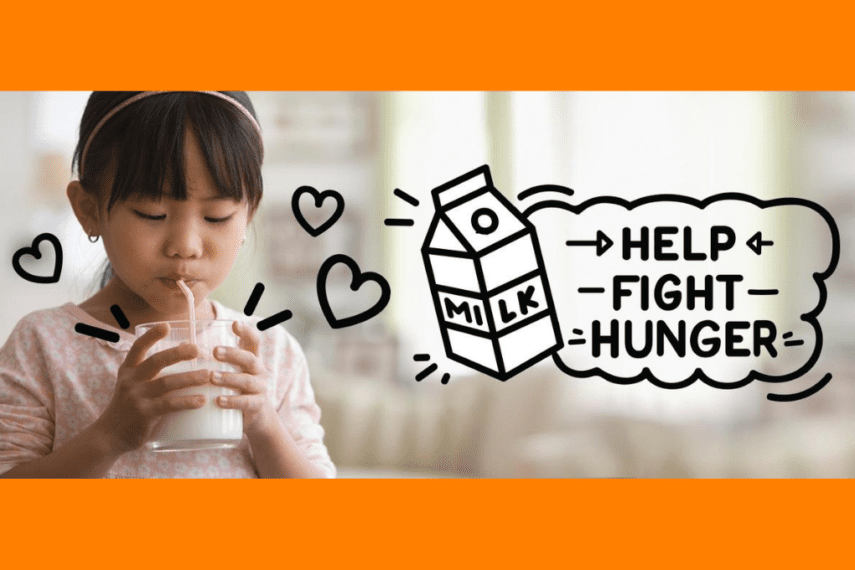
When I was a young mother and raising my four kids, I didn’t spend a lot of time thinking about their brain development. Of course, I wanted my kids to be as smart as possible, but I mainly focused on reading to them and engaging them in many different experiences.
Today, we know so much more about brain development and nutrition. Specifically, we understand that many nutrients influence the structure and functioning of the brain and that early nutrient exposure is key to optimal brain functioning and cognition.
In this article, I’ll dive into how dairy can help you influence your child’s developing brain and intelligence.
Early Nutrition and the First 1,000 Day Window
The first 1,000 days, from conception to age two years, is considered a critical time period for brain development.
Billions of baby brain cells develop during pregnancy. After birth, these cells begin to connect, and communication across the brain begins. You could say an information superhighway is being built. Specific areas of the brain develop in response to nutrition and the social environment, like when babies see different facial expressions or recognize their parent’s voices. When we play with babies, they learn even more.
Nutrition is key to the brain-building process. The brain uses more than half the daily calories a baby consumes for its development and function and doubles in size in the first year. It triples in size by age three. In fact, a child’s brain is 85% the size of an adult brain by this time!
Although certain nutrients are considered essential to brain development, like iron and DHA, there are many nutrients needed each day to support optimal intelligence and functioning.
In the first year of a baby’s life, breast milk or infant formula is the ideal source of nutrition. They provide an array of nutrients that support the growth of the body, brain, and bones.
After age one, however, milk and dairy foods, along with other foods, set the stage for continued brain development and optimal functioning.
7 Key Nutrients From Dairy to Help Young Brains Develop
As a busy mom and pediatric dietitian, I’m always looking for food efficiency. I look for foods that offer a rich source of nutrients to help my kids and those families with whom I work get closer to what they need nutritionally.
According to a position statement from the American Academy of Pediatrics (AAP), children require fourteen different nutrients from their diet to support ongoing brain development.¹ Milk and dairy foods naturally offer seven of these key nutrients: protein, iodine, zinc, choline, vitamin A, cobalamin (vitamin B12), and selenium. Let’s dive into how each of these nutrients may affect brain development and health in children. ²
Protein
Protein is involved in every process of neurodevelopment, including the creation of neurons and their migration across the brain, nerve myelination, and neurotransmission, which allows messages to be communicated across the brain.
Protein during pregnancy and early childhood is especially important for full brain development. How well a baby grows in the first year of life has been shown to affect their intelligence later on at 9 years of age. Inadequate protein consumption, malnutrition, and poor growth have been associated with smaller brains. ²
Iodine
The role of iodine is to make thyroid hormone, which helps regulate how humans use energy from food. Babies are most susceptible to iodine deficiency during pregnancy and early in life if they are breastfeeding.
Low iodine intake during pregnancy is linked to the development of ADHD and autism in children.² And, inadequate iodine in the first 1,000 days may impair cognitive development contributing to lower IQ, especially in verbal and language skills.
Iodine is found in iodized salt, but with the growing trend of non-iodized specialty salts, the prevalence of iodine deficiency, especially in pregnant mothers, has increased in the last decade. Furthermore, children are falling below expected iodine consumption as well, mostly due to less dairy consumption. ³
Dairy foods are a natural source of iodine, as are fish, eggs, seafood, and iodized salt.
Zinc
Zinc, like protein, is required for many brain functions, including neurogenesis (making neurons), myelination, creation of synapses, and more. An early zinc deficiency may lead to poor learning, attention, memory, and mood. ⁴
Choline
Choline is an essential nutrient, meaning we must get this nutrient from food because our body’s ability to make it is limited or non-existent. We can make some choline but not enough to meet our daily needs. In the brain, choline plays a key role in the structural integrity of membranes and neurotransmission. ⁵
Vitamin A
This micronutrient acts as a signaling molecule in the brain. There also seems to be a role in memory, learning, and maintaining the plasticity of the brain.
Cobalamin (Vitamin B12)
A lack of vitamin B12 has been linked to cognitive impairment and psychiatric and behavior disorders, oftentimes before anemia associated with B12 deficiency sets in. ⁶ Children who are following a vegan diet, or who avoid milk, dairy foods, and meat may be at higher risk for inadequate vitamin B12 in their diet.
Selenium
In adults, a good selenium status has been associated with good cognitive function. In a follow-up study that looked at Bangladeshi children at age 1.5 years, and then again at age 5 and later at age 10, found that mothers with good prenatal selenium status had children with higher cognition function scores at 5 and 10 years of age. ⁷ More research is needed in this area.
Other Nutrients From Dairy Impacting Brain Development
Experts in brain development point out other emerging nutrients in dairy that may have a positive influence on brain development.
Riboflavin (Vitamin B2)
Collectively, all 8 B vitamins play a role in brain health, because they are interrelated and co-dependent. For good functioning of the brain, all B vitamins must be at adequate levels.
Riboflavin plays a role in the metabolism of essential fatty acids in brain lipids, the absorption and utilization of iron, and the regulation of thyroid hormones. Inadequate riboflavin is associated with fatigue, brain dysfunction, and personality changes. ⁶
Vitamin D
Vitamin D is essential for brain development and health. It is a neuro-steroid with several functions in the brain and is involved in the development of neurons early in life. Newer studies suggest that higher levels of vitamin D during pregnancy and in early life may reduce the risk of autism. Because vitamin D has a receptor on every cell in the body, the brain included, deficiency of this vitamin can have widespread ramifications. A vitamin D deficiency is linked to dementia, depression, diabetes mellitus, autism, and schizophrenia. ⁸
Dairy Foods Can Support Brain Development and Health
Keeping track of nutrition for your little one isn’t easy, but it can be easier when you look for foods that offer multiple key nutrients. While there are other required nutrients for healthy brain development and optimal intelligence, milk and dairy foods are efficient food sources containing many of the required key brain nutrients.
From pregnancy through birth and beyond, consuming milk and dairy foods may help all children get more of the key nutrients they need for optimal cognitive development, intelligence, and brain health.
Jill Castle is the author of Kids Thrive at Every Size (Workman 2024) and one of the nation’s premier childhood nutrition experts. She is the founder and CEO of The Nourished Child®, a nutrition education website and podcast for parents, and the author of books including Eat Like a Champion, Try New Food, The Smart Mom’s Guide to Starting Solids, The Smart Mom’s Guide to Healthy Snacking, and co-author of Fearless Feeding.
References:
1. Sarah Jane Schwarzenberg, Michael K. Georgieff, COMMITTEE ON NUTRITION, Stephen Daniels, Mark Corkins, Neville H. Golden, Jae H. Kim, C. Wesley Lindsey, Sheela N. Magge; Advocacy for Improving Nutrition in the First 1000 Days to Support Childhood Development and Adult Health. Pediatrics February 2018; 141 (2): e20173716. 10.1542/peds.2017-3716.
2. Cusick, S. E., & Georgieff, M. K. (2016). The Role of Nutrition in Brain Development: The Golden Opportunity of the “First 1000 Days.” The Journal of Pediatrics, 175, 16–21. https://doi.org/10.1016/j.jpeds.2016.05.013
3. Zhang, K., Cheng, J., Yu, J., Chen, Y., Shi, X., Zhu, C., Lu, Y., Wang, N., & Han, B. (2022). Trends in Iodine Status Among U.S. Children and Adults: A Cross-Sectional Analysis of National Health and Nutrition Examination Survey Data from 2001-2004 to 2017-2020. Thyroid: Official Journal of the American Thyroid Association, 32(8), 962–971. https://doi.org/10.1089/thy.2022.0103
4. Golub, M. S., Keen, C. L., Gershwin, M. E., & Hendrickx, A. G. (1995). Developmental zinc deficiency and behavior. The Journal of Nutrition, 125(8 Suppl), 2263S-2271S. https://doi.org/10.1093/jn/125.suppl_8.2263S
5. Derbyshire, E., & Obeid, R. (2020). Choline, Neurological Development and Brain Function: A Systematic Review Focusing on the First 1000 Days. Nutrients, 12(6), Article 6. https://doi.org/10.3390/nu12061731
6. Kennedy, D. O. (2016). B Vitamins and the Brain: Mechanisms, Dose and Efficacy—A Review. Nutrients, 8(2), 68. https://doi.org/10.3390/nu8020068
7. Skröder, H., Kippler, M., Tofail, F., & Vahter, M. (2017). Early-Life Selenium Status and Cognitive Function at 5 and 10 Years of Age in Bangladeshi Children. Environmental Health Perspectives, 125(11), 117003. https://doi.org/10.1289/EHP1691
8. Anjum, I., Jaffery, S. S., Fayyaz, M., Samoo, Z., & Anjum, S. (n.d.). The Role of Vitamin D in Brain Health: A Mini Literature Review. Cureus, 10(7), e2960. https://doi.org/10.7759/cureus.2960



